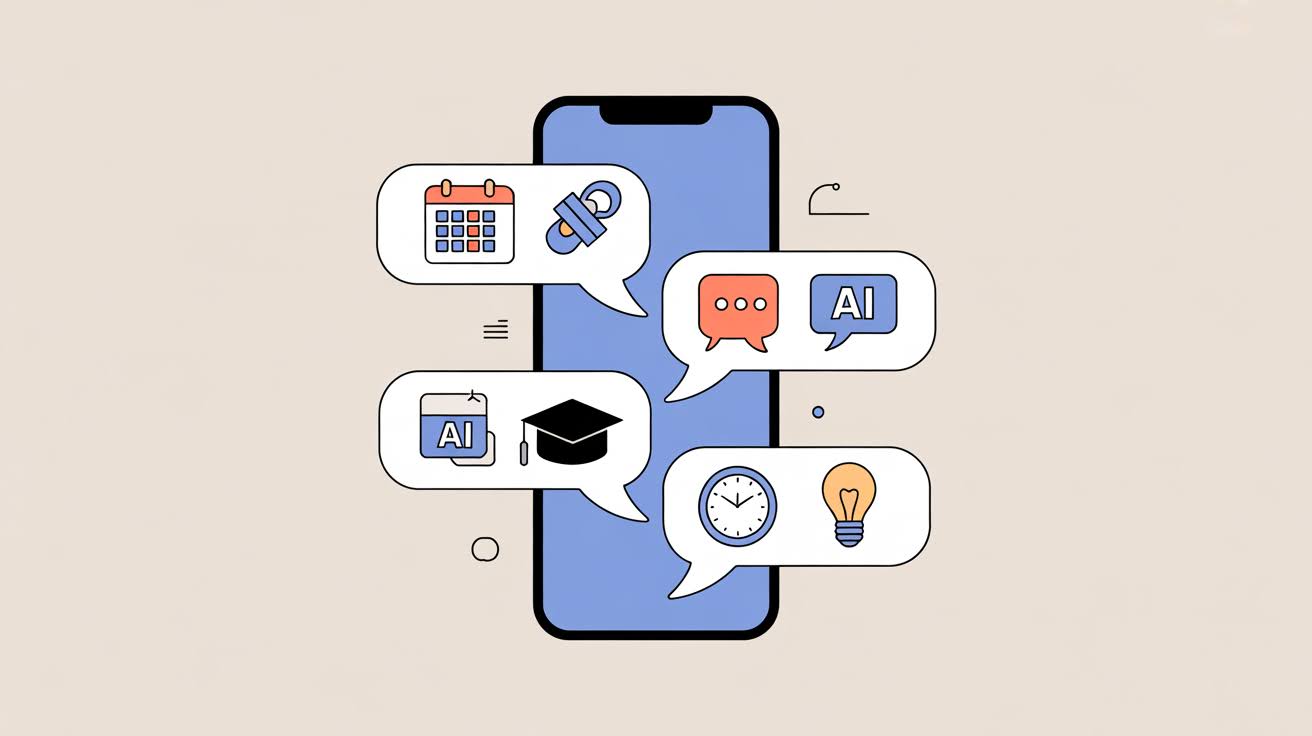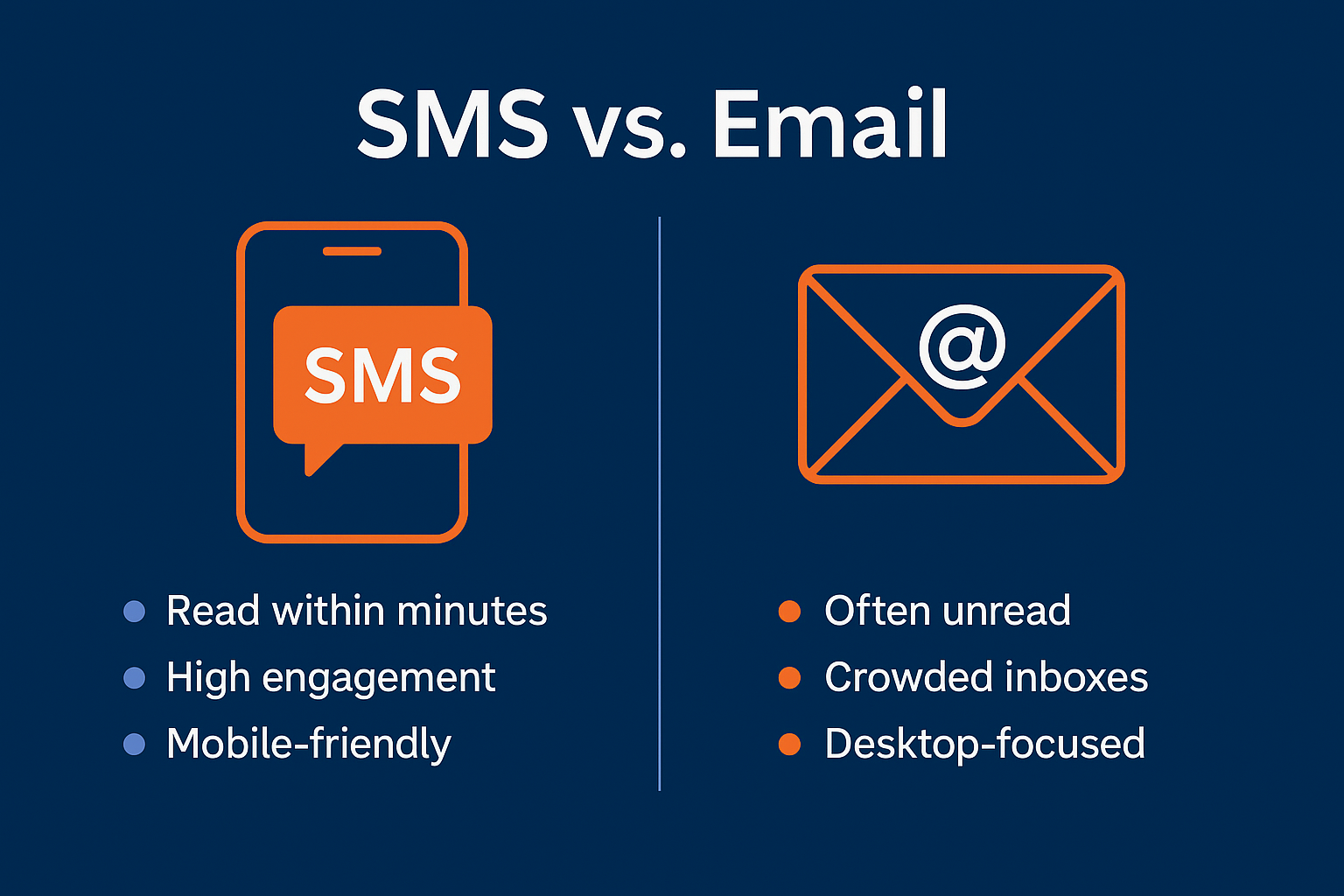How Texting Supports Adult Learners: AI-Enhanced Strategies for Higher Ed Success
Text messaging delivers unmatched engagement for adult learners, with 98% open rates compared to just 26% for emails.
- AI-powered personalization addresses individual barriers like scheduling conflicts and childcare needs.
- Two-way conversational SMS builds authentic relationships while accommodating busy adult schedules.
- Modern platforms integrate career pathway guidance directly into enrollment conversations.
- Strategic texting increases retention and program completion rates among non-traditional students.
AI-enhanced texting platforms make personalized engagement simple and effective.
Navigating education options pre-enrollment and succeeding once enrolled can be challenging for any student. But adult learners often face extra hurdles that traditional communication methods can't address.
Many adult learners struggle to research and understand how they can enroll and why they should. Unlike Gen-Z students who are digital natives, you can't assume that adult learners will skillfully navigate your college's website to proactively research options on their own. These evolving learner preferences create new challenges for institutions trying to reach this demographic.
Fortunately, texting for adult learners can be a spectacular tool to have in your arsenal. Text messages achieve significantly higher open rates compared to institutional emails, with most SMS messages read within minutes of receipt, while emails often go unread in crowded inboxes. Unlike phone calls and email, texting offers flexibility. Your prospective student can get personalized support without feeling pressured to respond immediately. Students with low English writing skills can use even emojis or free translation software to communicate.
Modern AI-enhanced texting platforms take this further by delivering personalized, contextual support that adapts to each learner's unique circumstances and goals.
What Makes Adult Learners Unique in Their Communication Needs?
Adult learners lead complex lives beyond their educational pursuits. Many are parents and/or caregivers to elderly relatives, work full or part-time, are immigrants or are military veterans. Adult learners cite text messaging as their preferred institutional communication channel because it accommodates their schedules and allows them to engage on their own terms.
These multiple identities influence daily challenges and needs, impacting how they interact with your college or university. Acknowledging your students' other identities and providing support related to these aspects of their lives can go a long way in helping your students feel understood and cared for.
Consider connecting students with resources that support their needs: daycare options for parents, veteran resources and community groups, cultural navigation support for immigrants and time management guidance for all adult learners juggling multiple responsibilities.
Modern AI-powered texting platforms can automatically identify and respond to these diverse needs through intelligent conversation flows, proactively identifying support needs and suggesting relevant resources while alerting human advisors for personalized follow-up.
How Can Texting Address Adult Learners' Flexibility Challenges?
The majority of adult learners are either working, actively job searching, caring for dependents or managing all three simultaneously. Many also navigate health issues, financial constraints or frequent travel requirements.

No matter their circumstances, adult learners appreciate flexibility. Personalized text messaging yields a 45% student response rate, significantly higher than traditional communication methods, because it addresses specific flexibility needs.
Texting for adult learners helps uncover the type of flexibility each student seeks: flexible class meeting times and locations, adaptable classroom technology options and adjustable timelines for completing program requirements.
Your prospective non-traditional students may have inaccurate assumptions about their options to advance their learning. They often assume their schedule and responsibilities make enrollment impossible. Strategic text messaging can bust these myths and allow adults to seriously consider your learning programs for the first time.
Advanced SMS for colleges now includes AI-driven scheduling optimization that analyzes stated availability and automatically suggests class combinations that fit individual lifestyles. These systems predict potential scheduling conflicts based on typical work patterns and proactively offer alternatives, while enabling dynamic program recommendations based on real-time labor market data.
Why Do Program Outcomes Matter More for Adult Learners?
Unlike traditional college students who often enroll at 18 without focused goals, adult learners research education options, expecting specific outcomes. Individual and personalized text messages support learners in working toward specific education goals.
Adult learner engagement spans diverse educational pathways, each with distinct outcome expectations:
Basic Education Pathways:
- English as a Second Language (ESL) students want to acquire skills to speak, read, write and listen in English for the first time
- Adult Basic Education (ABE) students seek fundamental literacy and math skills
- High School Equivalency (HSE) students want to earn their GED or equivalent credential
Career-Focused Pathways:
- Working professionals seek advancement opportunities, salary increases and leadership skills
- Career changers pursue new certifications and credentials for industry transitions
- Workforce development participants need specific skills training for in-demand jobs
- Continuing education students require ongoing professional development and certifications
All of these learners share common goals: improving their employment prospects, increasing earning potential, advancing in current careers or successfully transitioning to new fields.
You can use texting to explain how your institution's programs support these diverse outcomes. For basic education, the Coalition for Adult Education shows compelling results: GED completers earn an average $9,000 more annually, with 72% passing rates and 45% continuing to higher education. For career-focused programs, outcomes include industry certifications, salary increases, promotion rates and successful career transitions.
AI-enhanced texting platforms can now deliver sophisticated outcome messaging by connecting program completion to specific career pathways in real time, sharing personalized statistics based on local job markets and helping students understand exactly how their education investment will pay off in their geographic area and career field.
How Does AI Enhance Texting for Adult Learners?
Generative AI is transforming how institutions engage with adult learners through SMS. Rather than relying on static, pre-written messages, AI-powered platforms conduct nuanced conversations that adapt to individual student needs and circumstances.

Modern AI systems excel at identifying and addressing the unique barriers adult learners face. When a student expresses concern about balancing work and school, AI can immediately provide relevant resources while flagging the conversation for human follow-up. This blended approach combines AI efficiency with human empathy, ensuring students receive both immediate support and meaningful personal connection.
AI enhancement enables several key capabilities for higher ed communication tools:
- Predictive Messaging: AI analyzes conversation patterns to anticipate student needs before they're expressed. If a student typically asks about childcare during registration periods, the system proactively shares relevant information.
- Dynamic Personalization: Beyond using names, AI personalizes content based on work schedules, family situations, learning goals and previous interactions. Each message feels specifically crafted for that individual's circumstances.
- Intelligent Escalation: AI recognizes when conversations require human intervention and seamlessly transfers complex discussions to appropriate staff members while maintaining conversation context.
- Multilingual Support: AI can communicate effectively with ESL students, offering translation assistance and culturally appropriate messaging that respects diverse backgrounds.
These capabilities transform texting from a simple notification tool into a sophisticated engagement platform that truly understands and responds to adult learners' complex lives.
What Makes SMS More Effective Than Email for Adult Students?
While email remains the official communication channel for most colleges and universities, it's becoming a secondary consideration for students managing multiple responsibilities.

Text messaging cuts through digital noise with unmatched effectiveness. Unlike emails that might get buried in crowded inboxes, SMS delivers critical information directly to students' most-checked device. The character limitations inherent in texting actually benefit busy adult learners by forcing institutions to communicate concisely and directly.
For adult learners juggling responsibilities, SMS offers distinct advantages: immediate accessibility without requiring immediate response, reduced technology barriers compared to complex email systems, flexibility in response timing and a less intimidating communication format that encourages open dialogue about challenges and needs.
How Can Colleges Ensure Compliant Texting Practices?
While SMS offers tremendous benefits for adult learner engagement, institutions must navigate important compliance considerations to protect student privacy and maintain trust.
- FERPA Compliance: The Family Educational Rights and Privacy Act protects student educational records but doesn't prevent all text communication. Institutions can share general information and non-educational record details via SMS but must avoid sending grades, disciplinary information or other protected educational records through text messages.
- TCPA Requirements: The Telephone Consumer Protection Act requires explicit consent before sending marketing or promotional texts. For adult education programs, this means obtaining clear opt-in consent during application or enrollment processes.
- Best Practices for Compliance: Leading institutions use dedicated higher education texting platforms that automatically manage consent, maintain clear records of communication preferences and train staff on appropriate content for SMS versus other channels.
Modern platforms include built-in compliance features that automatically handle these requirements, allowing staff to focus on building meaningful relationships rather than worrying about regulatory violations. Transparency remains vital. Students should always understand who is texting them, why they're receiving messages and how to opt out if desired.
Five Proven Strategies for Adult Learner Text Engagement
Successful adult learner engagement through texting requires strategic planning and thoughtful execution:
- Build Relationships First: Focus on getting to know each learner before promoting programs or services. Ask about their goals, challenges and preferences to enable more effective personalized messaging later.
- Timing Matters: Adult learners respond best to texts outside traditional work hours. Before 9 AM and after 5 PM typically see the highest engagement rates. Weekend messaging should focus on event reminders rather than administrative tasks.
- Keep It Conversational: Avoid institutional jargon and formal language. Write as if you're talking to a friend who happens to be considering education. This approach reduces intimidation and encourages genuine dialogue.
- Provide Immediate Value: Every text should offer something useful, whether it's answering a question, sharing a relevant resource or providing encouragement. Avoid purely promotional messages that don't benefit the recipient.
- Follow Through Consistently: Greater reply frequency correlates with improved academic outcomes. Consistent, meaningful engagement builds trust and keeps students connected to their educational goals.
These strategies work because they acknowledge adult learners as whole people with complex lives rather than treating them as simple prospects to convert.
How Do Career Pathways Integrate with Adult Learner Texting?
Modern adult learners want clear connections between their educational investments and career outcomes. Advanced texting platforms now integrate real-time labor market data to help students understand exactly how their program choices will impact their earning potential and career prospects.

AI-enhanced systems deliver personalized career guidance through SMS by analyzing local job markets, salary trends and growth opportunities. When an adult learner expresses interest in a particular program, the system can immediately share relevant employment statistics for their geographic area.
Modern platforms connect students with career services, schedule informational interviews with professionals in their field of interest and provide ongoing support as they transition from learners to earners. Career pathway guidance delivered through text messaging helps students stay motivated and focused on their long-term goals, resulting in more informed decision-making and higher program completion rates.
FAQs
How often should institutions text adult learners? Best practices suggest no more than one outgoing text per week and no less than one per month. The quality and relevance of messages matter more than frequency in texting for adult learners.
What types of information can be shared via SMS under FERPA? General institutional information, event announcements, deadline reminders and non-educational record details are appropriate. Avoid sharing grades, disciplinary records or other protected educational information.
How do AI-powered texting platforms handle language barriers? Modern higher ed communication tools include real-time translation capabilities and can communicate effectively with ESL students, offering culturally appropriate messaging and translation assistance.
How do institutions measure success in adult learner text engagement? Key metrics include response rates, enrollment conversions, program completion rates and student satisfaction scores. Advanced platforms provide comprehensive analytics to track these outcomes.
Boost Your Adult Learner Engagement Strategy
Text messaging has evolved from a simple communication tool to a sophisticated engagement platform that can transform how institutions connect with adult learners. By acknowledging the complex lives these students lead, leveraging AI to deliver personalized support and maintaining consistent, meaningful dialogue, colleges and universities can dramatically improve enrollment and retention outcomes.
Modern Campus has spent decades perfecting learner-to-earner lifecycle solutions that put students first. Our AI-enhanced Message platform combines sophisticated automation with genuine human connection, enabling institutions to scale personalized texting for adult learners while maintaining the authentic relationships that drive student success. Book a demo today to discover how Modern Campus can transform your adult learner engagement and drive measurable enrollment results.
Last updated: November 6, 2025
